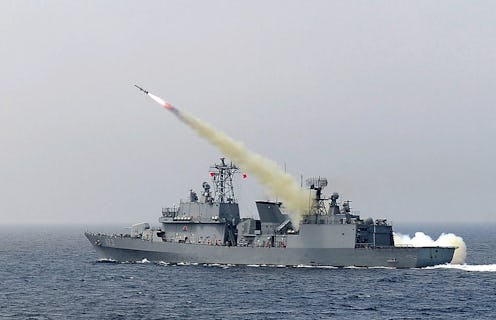
In response to North Korea's apparent escalation of its missile and nuclear program, Donald Trump issued a fairly unprecedented ultimatum. He warned North Korea on Tuesday to refrain from making any more threats against the United States, or it would be "met with fire and fury like the world has never seen." This pronouncement closely followed North Korea's testing of an intercontinental ballistic missile at the end of last month, which raises an important question: If such a missile could indeed target American cities, how much warning would the U.S. have if North Korea fired a nuclear weapon?
Analyses of last month's missile test indicate that the U.S. would likely have at least 45 minutes of warning, assuming that North Korea would not warn the United States before firing. According to CNN, the missile that North Korea tested last month was in flight for roughly 45 minutes before landing in the Sea of Japan. During this time, it traveled at a height of 2,300 miles for a distance of 621 miles.
American, South Korean, and Japanese analyses of the missile test indicate that the missile could reach major American cities like Los Angeles, Denver, and Chicago if it were fired along a flatter trajectory. David Wright, a missile expert at the Union of Concerned Scientists, wrote on the union's website that a missile could even get to New York or Boston in this case.
Wright also explained, however, that while the missile may have major American cities within range based on its test results, it is unclear how heavy a payload it could carry in its warhead. A missile can travel further distances with lighter payloads, but the weight North Korea's ICBM was carrying during its test is still unknown.
Before his already infamous "fire and fury" threat — which, according to the New York Times, was improvised — Trump had previously responded to North Korea's missile test in a written statement.
"Threatening the world, these weapons and tests further isolate North Korea, weaken its economy and deprive its people," Trump wrote in July. "The United States will take all necessary steps to ensure the security of the American homeland and protect our allies in the region."
But Trump's Tuesday ultimatum has already had consequences. A few hours after he made this remark, North Korean state media indicated that the country was considering a missile strike on U.S. military targets in Guam. The Washington Post reported that while North Korea has previously threatened missile strikes against the U.S., they have never been this specific in the past.
Despite this seemingly increased likelihood of a nuclear war — or at the very least, of the targeted firing of a nuclear weapon — U.S. Secretary of State Rex Tillerson suggested that Americans should not be too concerned.
"Nothing that I have seen and nothing that I know of would indicate that the situation has dramatically changed in the last 24 hours," Tillerson said on Wednesday. "Americans should sleep well at night."